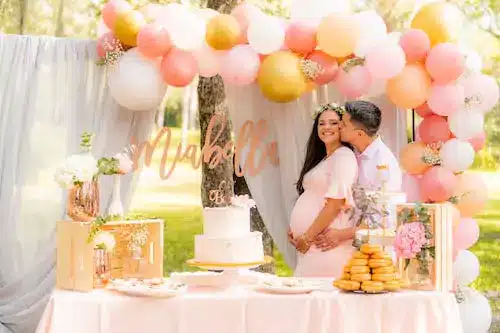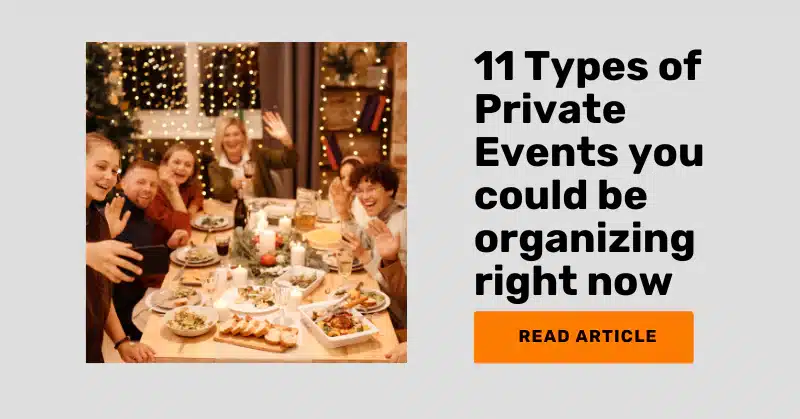The different types of private events cater to specific audiences for specific purposes.
This article delves into various types of private events, including weddings, birthdays, and corporate events.
We have outlined the intricacies of planning and execution. The comprehensive guide covers event management skills, planning processes, and tips for success.
A. What are private events?
Private events are those events that are organized for a specific audience and purpose. They’re not open to the general public.
These exclusive events are organized based on the needs and preferences of the host. Thus, it makes for a more personalized and intimate event experience.
There’s a wide range of occasions that call for a private event. We will cover some of them in the section below.
B. Types of private events
1. Weddings
Weddings are those private events that not only require a high degree of personalization but also meticulous planning.
There’s the ceremony, reception, decor, and catering that needs to be taken care of. All of this can only be made possible with a high level of coordination with vendors.

For wedding planning, vendor management is a skill you must have.
2. Birthday parties
Birthday party planning is a process of combining themes, decorations, entertaining, and catering. It marks a milestone for a person, thus it also requires personalized experiences.

Planning age-appropriate entertainment and activities is something you must do. Birthday parties as private events can help event planners channel their creativity.
3. Corporate events
Corporate events are intimate but they’re still exclusive. Thus, they can be clubbed under the category of private events.
Here, in addition to regular event planning roles, you must also ensure your event aligns with corporate objectives. You need to create a formal but warm atmosphere.

For any corporate event, event planners need to enable networking opportunities. Event branding must also be taken care of.
To get a better understanding of corporate event management, click on the linked article.
4. Family reunions
Family reunions can arise for numerous reasons. Perhaps for the return of one’s NRI offspring or even one’s admission to a dream college.
All sorts of good and bad news call for a family reunion, especially in countries like India.
Here, the event planner needs to ensure there’s something for everybody. The activities need to be inclusive for all ages.
In addition to venue, catering, and decor, accommodation for all is also to be arranged.
Creating multigenerational experiences and having good communication skills are a must.
5. Holiday parties
Festivals are important not just because of one’s religious beliefs, but also because it brings families together.

Thus, holiday party planning calls for seasonal theming and menu curation. It’s also a good idea to have thematic decor that goes with the holiday and period.
By creating a festive ambiance, you’re sure to please your client.
6. Retirement parties
Retirement parties are not just a huge milestone but also a moment of tears and joy. There’s a certain sadness that comes engulfed in a blanket of success.
Retirement party planning requires you to have your event flow in order. You need to coordinate speeches, entertainment, and cake-cutting.
Other than that, the decor and entertainment need to be in line with the retiree’s preferences. Thus, this event also requires a certain level of personalization.
The event ends with a meaningful gift given to the retiree.
7. Bridal/baby shower
Bridal and baby shower events are wholesome but private events. Here, an event planner is expected to manage the decor, games, catering, and customized gifts.

On top of this, one must also manage the gift registry. The bride or soon-to-be-mother is kept in the center of this whole experience. All creativity and coordination are channeled to make her experience pleasant.
8. Engagement parties
This pre-wedding event is rarely any less meticulous than wedding planning. Like weddings, it also includes a lavish venue, guest list, decor, catering, and entertainment.
The only difference is that it’s often a little more intimate than the wedding itself.

As an event planner, you must understand the couple’s preferences first. Then, you must communicate and coordinate well with your clients and vendors.
9. Anniversary celebrations
Anniversaries are a huge milestone for couples. As an event planner, you must understand the couple’s preferences and use your creativity thereon.
Curating a guest list and coordinating the speeches is an added task here.
A lot of anniversary celebrations these days also call for vow renewals. So this is a trend you can keep in mind while planning your next anniversary event.
10. Bachelor/bachelorette parties
This is undoubtedly the most fun pre-wedding event. Here, the soon-to-be bride/groom gets their last day of freedom and fun as singles.
An event planner is expected to be creative and keep an element of surprise.
11. Fundraising galas
Fundraising usually happens for a particular goal. It’s usually for a compelling social cause.
However, people don’t reach into their pockets to donate very easily. An event planner must create ample networking opportunities to convince people.
Having an event that aligns with fundraising goals and creates a compelling experience is necessary.
Knowledge of project management and attendee engagement is key to such private events.
C. How to plan private events
In the section above, you learned the various event planning skills required for each type of private event.
However, there’s also a broad structure to the personal event planning process. For any of the private events mentioned above, you will have to undertake the following steps:
- Begin with thoroughly hearing out your client’s vision and wishes. Upon understanding your client’s vision, you’ll be able to develop themes and details
- Once you know what your event must have, you’ll need to break down the cost of it. Your event budget will list all the potential and actual expenses. Use the linked guide to know the ins and outs of event budget formation
- Based on the budget, find the right venue that accommodates all the needs of your event and client
- Design and manage RSVPs using online software. Having a clear idea of the number of guests can help you bring down the cost
- Understand the flow of activities during the event and create a detailed timeline. This timeline must outline all the activities and tasks you have to undertake. This will make your work more efficient leading up to the event
- Since we know event planning is not a one-man-job, you’ll need vendors. Coordinate with various vendors for catering, flower arrangement, photography, and entertainment
- If you’re hiring celebrities to perform at your private event, you can use the linked guide to learn how
- Work out the logistics of the event. This includes the event setup, schedule, transportation, and any special arrangements
- On the day of the event, you’re expected to see whether the plan is executed as discussed. For this, you’ll have to coordinate with the vendors and manage the timeline
- On the day of the event, you must also ensure that all potential challenges are dealt with. Having Plan B’s and contingency plans beforehand can come in handy here
D. Tips to master different types of private events
You’ve read about the different types of private events and how to organize them. But if that’s something you already knew, you’d be interested in this section.
Here, we’ll be sharing some tips and tricks to improve your event planning skills:
- Personalization: Put on your creative hats as private events are personal. Tweak the theme, decor, or activities to add a touch of personalization
- Vendors: Build relationships with reliable vendors who can be held accountable
- Communication: Have open and clear communication with your clients and vendors
- Guest experience: Make this your priority if you want a successful event planning career
- Technology: Get yourself handy tech and tools like this private event ticket generator
- Feedback: Both negative and positive feedback from your clients and attendees is going to make you a better event planner
E. FAQ
1. What is private event management?
Private event management refers to event planning and execution for exclusive events like anniversaries and birthdays. Event managers play a crucial role here by creating a personalized experience for clients. They also oversee the venue selection, catering, logistics, and entertainment.
2. Why should I organize private events?
Organizing different types of private events can be a really good learning and rewarding experience. Here’s why:
- Creating intimate events and experiences tailored to your client’s desires helps forge deep bonds. This client-event manager relationship is unmatched in any other type of event
- You get better control over the guest list
- The smiles on people’s faces after the event are worth remembering
- You get more creative freedom in this type of event management
- Such events are mostly emotional, therefore, the budget happens to be flexible
3. Public event vs private event: which one should you organize?
Private events have a set guest list whereas public events don’t.
You should organize public events for the following reasons:
- Better brand visibility
- Community building
- Reaching a large audience at once
However, you need to keep in mind that managing large crowds securely along with logistics is not easy.
On the other hand, you should be organizing private events if you’re looking forward to:
- Creating intimate and personalized experiences for a small crowd
- Want to have more control over the guest list and event experience
- A rewarding experience to make people happy on their milestone events
However, client communication can often go south in such events. There’s also an added pressure to make the event perfect for the client.
Therefore, the decision to organize either of the event types is based on a lot of factors. You should also consider the budget and nature of the occasion before deciding.
F. Summarizing types of private events
In this article, we’ve not only told you about the different types of events. Rather, we also discussed the importance of personalization and prioritizing guest experiences.
We hope we were able to share some tips and tricks that are going to make your next event better.
For more helpful event planning tips and tricks, join us on LinkedIn.






